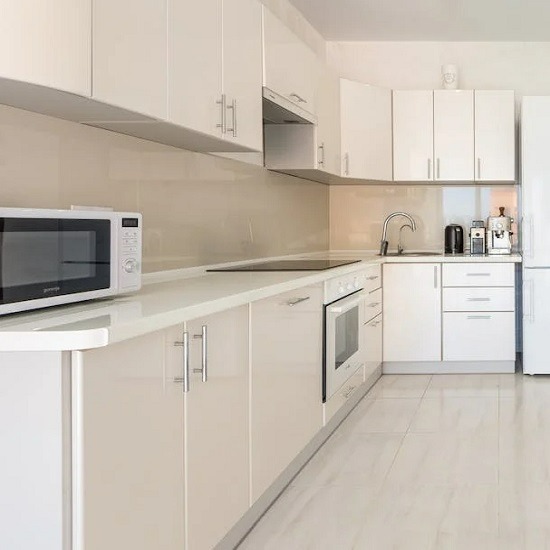Many disruptive trends have shaped the interior design industry, especially in the kitchen. Currently, porcelain is the material of choice for most worktop designs and is slowly phasing out marble and granite. Its appealing design and durability has made it popular for bathroom fixtures, floors and even walls.
These features also explain why porcelain is the ideal option for kitchen worktops as it requires minimal maintenance. However, for these worktops to serve you efficiently, they still needs constant care and maintenance. Neglecting them would make the sheen dull, with visible scratch marks and stains. Therefore, if you want the best service from your porcelain worktops, here are some care and maintenance tips to consider.
Are Porcelain Worktops Delicate?
While porcelain dinnerware is known to be fragile, the worktops are different. The porcelain worktops are built thicker and are cured at high temperatures, over 1200°C. This process creates a rigid surface that is heat, scratch and damage resistant.
The treatment also makes the surface waterproof and non-porous so they do not stain. Moreover, their non-reactive nature makes them safer to work with acidic food spills like wine and vinegar. Since porcelain kitchen worktops can handle anything thrown at them, they only require simple care and maintenance routines, as we discuss here.
Care and Maintenance of Porcelain Worktops
Routine Cleaning
Porcelain worktops add flexibility and enduring flexibility at home. The primary care routine for these worktops is regular cleaning to extend their decades-long lifespan. Cleaning the porcelain kitchen worktops helps remove soap scum, mildew and hard water deposits.
However, avoiding cleaning products containing harsh chemicals like ammonia and other acids is advisable. These substances potentially damage the glossy surface of the porcelain worktop, ruining its quality. There are a few ways to clean porcelain tiles;
Using Spray Cleaners
Spray cleaners are effective for cleaning porcelain worktops because they maintain the surface shine. Ensure you use a cleaner specifically meant for porcelain to remove the grease and grime. These products are safe and do not leave residues or odours on the surface.
Using White Vinegar
Vinegar is also one of the best porcelain cleaners, considering it keeps the worktop shining. Mix a small amount of white vinegar with distilled water to clean the worktop. Use a rag or sponge to wipe the surface and remove any stains. Rinse the porcelain worktop with clean water and dry it using a cotton towel before using it.
Using a Multi-Surface Disinfectant
Multi-surface disinfectants are perfect for cleaning porcelain worktops because they also remove tough stains. However, some contain small amounts of ammonia that may reduce the shininess of the porcelain, making them look dull. After using a multi-surface disinfectant, use the spray cleaner for a complete shine. After you buy a worktop online, test these products to determine if they are ideal long-term cleaning solutions.
Preventing Stains and Scratches
Although porcelain is scratch and stain resistant, the surfaces are still susceptible to damage. Therefore, avoiding exposure to permanent dyes and inks is crucial since they are not removable. If the surface comes into contact with such substances, rinse the worktop using clean water and an approved cleaning product. Even after spilling juice, water, and wine on a porcelain countertop, clean it immediately to prevent the build-up of stains.
Once you buy a worktop online, avoid using sharp utensils when chopping vegetables, preparing food or slicing bread. Instead, use a chopping board to keep the porcelain worktop intact. Consider using soft, non-abrasive cleaning materials to clean the surface helps maintain the sheen.
Protecting Porcelain Surface
Although porcelain surfaces do not require sealing, you can seal them for extra protection, especially on the grout and joints. You should use products that are porcelain- and grout-friendly.
Use an adhesive remover to remove the sealing material from porcelain countertops. Before proceeding, test on a small area first. Apply a small amount of the adhesive remover in a small section of the worktop, and let it sit until it softens the sealer. Reapply the adhesive remover to soften the sealer further so you can wipe it off using a cleaning sponge or towel.
Avoiding Heavy Objects
Porcelain kitchen worktops are durable and resilient, which reduces the need for care and maintenance. While they are designed to manage weight throughout their lifetime, there are instances when they can easily get damaged. Therefore, avoiding standing on the worktop or placing heavy equipment and appliances is crucial.
While you may not notice the cracks forming, prolonged activity may ruin the quality of the worktop. On the same note, protect your porcelain countertop from heat damage by using hot pads or trivets when placing hot pans and pots on the surface.
Porcelain worktops are affordable, durable and more hygienic, explaining their popularity in various parts of the world. They are also easy to install for retrofitting or building a new kitchen. Maintenance remains crucial to get the best service from these worktops despite the indestructible nature of the material. The simple care and maintenance steps highlighted above have proven effective and work for all countertops. However, if you need further assistance, contact a professional cleaning service or installer for guidance.












